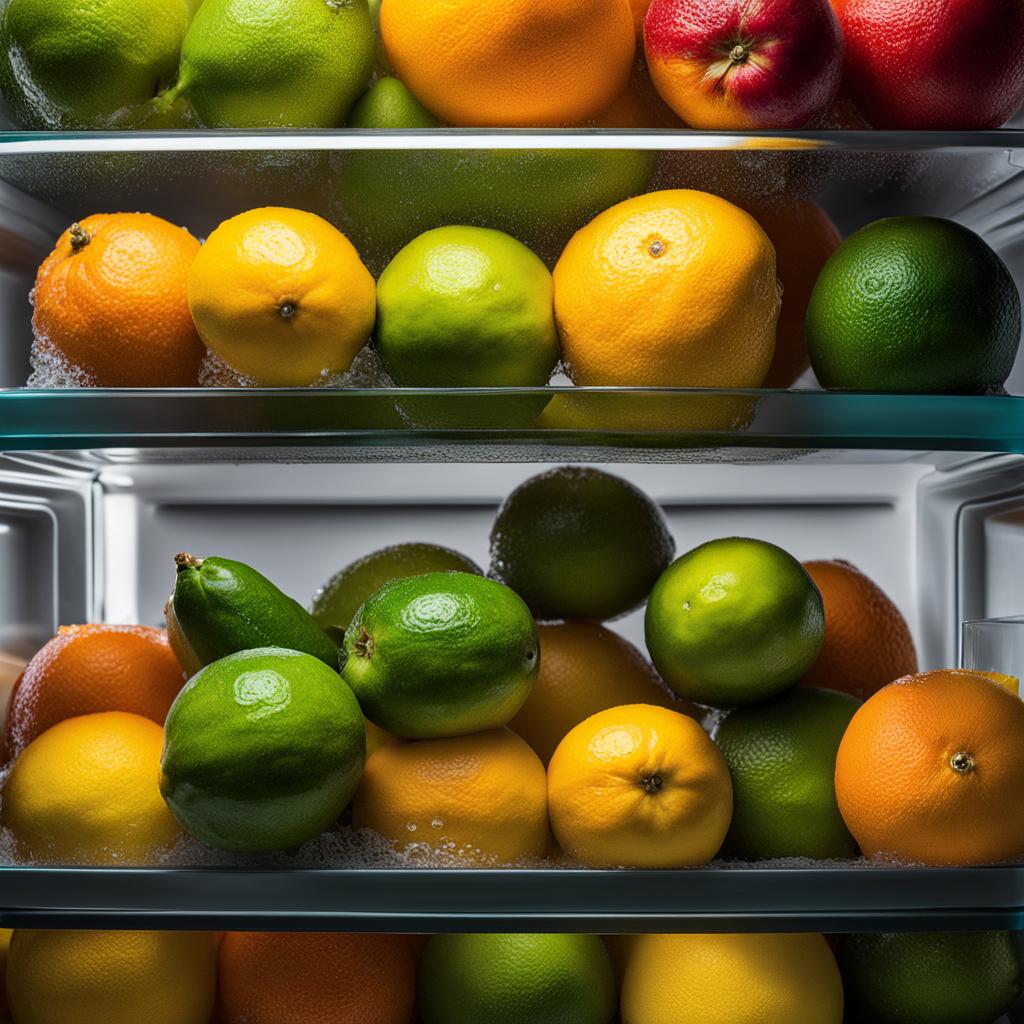Hi there! Today, I’m going to share with you some tips on how to store citrus fruits to ensure they retain their best flavor and freshness. Whether you’re a fan of oranges, lemons, limes, or any other citrus varieties, proper storage techniques can make a significant difference in preserving their taste and quality.
Key Takeaways:
- Storing citrus fruits correctly helps preserve their flavor and freshness.
- Consider storing at room temperature or refrigeration depending on your usage timeframe.
- Avoid piling fruit on top of each other to allow proper airflow.
- Keep an eye out for signs of spoilage like discoloration, sour taste, or mold.
- Freezing citrus fruits can prolong their shelf life and maintain their nutritional value.
The Best Storage Method
When it comes to storing citrus fruits, there are a few techniques and tips that can help you keep them fresh and flavorful for longer. Let’s explore the best storage methods for citrus fruits.
Room Temperature vs. Refrigeration
Citrus fruits can be stored either at room temperature or in the refrigerator, depending on how quickly you plan to use them. If you expect to consume the fruits within a day or two, storing them at room temperature is perfectly fine. However, if you want to extend their shelf life, refrigeration is the way to go.
For optimal freshness, refrigerate your citrus fruits between 41 and 42 degrees Fahrenheit (5 to 6 degrees Celsius). This temperature range helps slow down the ripening process and preserves the flavor and juiciness of the fruits. However, it’s important to note that grapefruits can be stored at slightly higher temperatures, up to 48 degrees Fahrenheit (9 degrees Celsius).
Mesh Bags for Better Airflow
When storing citrus fruits in the refrigerator, it’s a good idea to transfer them from plastic bags to mesh bags. Mesh bags promote better airflow around the fruits, reducing the risk of mold growth and ensuring even cooling. Place the mesh bags in the crisper drawer of your refrigerator, which is designed to maintain higher humidity levels to prevent the fruits from drying out.
Table: Comparing Room Temperature and Refrigeration Storage
| Storage Method | Temperature | Shelf Life | Benefits |
|---|---|---|---|
| Room Temperature | Around 70 degrees Fahrenheit (21 degrees Celsius) | A couple of days | Convenience |
| Refrigeration | Between 41 and 42 degrees Fahrenheit (5 to 6 degrees Celsius) | Three to six weeks | Extended shelf life |
By following these storing techniques and tips, you can ensure that your citrus fruits stay fresh and delicious for as long as possible.
Tips for Room Temperature Storage of Citrus Fruits
When it comes to storing citrus fruits at room temperature, there are a few important tips to keep in mind. By following these techniques, you can ensure that your citrus fruits stay fresh and maintain their delightful flavor for as long as possible.
Avoid Direct Sunlight
First and foremost, it is crucial to keep your citrus fruits away from direct sunlight. Exposure to sunlight can cause the fruits to ripen faster and develop a bitter taste. Find a cool spot in your kitchen or pantry where the fruits can stay away from direct sunlight, preserving their freshness.
Adequate Air Circulation
Another key tip for room temperature storage of citrus fruits is to avoid piling them on top of one another in a small bowl. This can restrict airflow and lead to moisture buildup, which can result in mold growth. Instead, place the fruits in a single layer in a breathable container or place them individually on a countertop to allow for better air circulation.
Transfer to Refrigerator
While citrus fruits can remain fresh at room temperature for a couple of days, it’s best to transfer any remaining fruits to the refrigerator after two to three days. This will help preserve their quality and extend their freshness for a longer period.
| Citrus Fruit | Storage Temperature | Shelf Life |
|---|---|---|
| Oranges | Room temperature | 2-3 days |
| Lemons | Refrigerator | 1-2 weeks |
| Limes | Refrigerator | 1-2 weeks |
By following these simple tips, you can enjoy the full flavor and freshness of your citrus fruits for an extended period. Whether you’re adding a zesty kick to your favorite recipes or enjoying a refreshing citrus snack, proper storage is key to maintaining the optimal taste of these vibrant fruits.
Citrus Storage Tips: How to Keep Your Fruits Fresh and Flavorsome
Proper storage techniques are key to preserving the freshness and flavor of citrus fruits. Whether you prefer oranges, lemons, limes, or any other citrus variety, following these tips will ensure your fruits stay delicious for longer periods.
1. Choose the Right Storage Location
When it comes to citrus storage, it’s important to consider the optimal temperature and humidity levels. Citrus fruits can be stored at room temperature or in the refrigerator, depending on your preference and needs. However, keep in mind that refrigerating your citrus fruits will extend their shelf life.
For room temperature storage, find a cool spot away from direct sunlight. Avoid crowded storage by spreading out the fruits in a well-ventilated area. This allows for better airflow, reducing the risk of mold growth.
2. Properly Store in the Refrigerator
Refrigerating citrus fruits can help preserve their freshness and flavor. To store them in the refrigerator, place them in perforated plastic bags or transfer them to mesh bags. This allows for proper airflow and prevents excess moisture buildup.
Set your refrigerator temperature between 41 and 42 degrees Fahrenheit for optimal citrus storage. However, keep in mind that grapefruits can tolerate slightly higher temperatures of up to 48 degrees Fahrenheit. This will help maintain the quality of your fruits and extend their shelf life.
3. Handle with Care
When handling citrus fruits, avoid excessive squeezing or pressure as it can damage their delicate texture. Gently handle each fruit to prevent bruising or puncturing the skin, which can lead to spoilage.
Additionally, regularly inspect your citrus fruits for any signs of spoilage. Discard any fruits that have mold growth, a sour smell, or a fermented taste. Overly soft, mushy, or dried-out fruits should also be discarded.
By following these citrus storage tips, you can enjoy the vibrant flavors and freshness of your citrus fruits for an extended period.

Freshness and Signs of Spoilage
When it comes to storing citrus fruits, maintaining their freshness is key to ensuring their delicious taste and quality. However, it’s important to be able to identify the signs of spoilage to avoid consuming fruits that may have gone bad.
One of the most obvious indicators of spoiled citrus fruits is discoloration. While minor blemishes on the rind are normal, any significant changes in color, such as moldy spots or an overall dark appearance, should be a red flag. Additionally, if the fruit has a sour or fermented taste and emits an unpleasant smell, it’s best to discard it.
To summarize:
- Look for discoloration, moldy spots, or a dark appearance on the fruit.
- Check for a sour or fermented taste and an unpleasant smell.
Furthermore, it’s important to note that citrus fruits should not be overly soft, mushy, or dried out. These are additional signs of spoilage and should prompt you to dispose of the fruit.
By being vigilant and paying attention to these signs, you can ensure that you only consume fresh and delicious citrus fruits.
| Signs of Spoilage | What to Do |
|---|---|
| Discoloration, moldy spots, or a dark appearance | Discard the fruit |
| Sour or fermented taste, unpleasant smell | Discard the fruit |
| Overly soft, mushy, or dried out | Discard the fruit |
Tips for Prolonging Freshness
When it comes to storing citrus fruits, there are simple tips and tricks that can help extend their freshness and keep them delicious for longer periods. Here are some useful tips:
Maintain Low Humidity
High humidity can lead to moisture build-up, which can cause citrus fruits to spoil quickly. To prolong their freshness, store them in a cool, dry place with low humidity. This will help prevent mold growth and keep them tasting their best.
Inspect Regularly
It’s important to regularly inspect your citrus fruits for any signs of spoilage. Check for soft spots, mold, or an off smell. If you notice any of these signs, it’s best to discard the fruit to avoid any risk of consuming spoiled fruit.
Consider Freezing
If you find yourself with an abundance of citrus fruits that you won’t be able to consume before they spoil, consider freezing them. Freezing citrus fruits is a great way to preserve their flavor and nutritional value. You can freeze them in slices or as juice, making it convenient to use them in smoothies or recipes later on.

Citrus fruits have a fascinating history that traces back to their origins as rare luxury fruits in Western history. These fruits were once considered a symbol of wealth and nobility due to their scarcity and exotic origins. The cultivation and trade of citrus fruits played a significant role in shaping the history of various civilizations.
In ancient times, citrus fruits were highly valued for their medicinal properties and were even considered as a luxury item. The rarity of these fruits made them a status symbol among nobles and the wealthy. It wasn’t until the 15th century that citrus fruits, such as lemons and oranges, began to be cultivated on a larger scale in Europe.
Over time, different varieties of citrus fruits emerged through hybridization. The citrus family tree expanded, giving rise to various hybrids of hybrids. Today, citrus fruits are widely available and affordable, enjoyed by people all around the world.
Freshness and Ripeness
When it comes to citrus fruits, ensuring their freshness and ripeness is key to enjoying their delicious flavors. But what factors contribute to the freshness and ripeness of these fruits? Let’s explore the role of ethylene gas and the process of degreening in maintaining the quality of citrus fruits.
The Role of Ethylene Gas:
Did you know that many citrus fruits are harvested while still green on the outside? This is because they continue to ripen after being picked. Ethylene gas plays a crucial role in this ripening process. When citrus fruits are exposed to ethylene gas, they undergo physiological changes that enhance their flavor, aroma, and color.
The Process of Degreening:
Degreening is a process commonly used to accelerate the ripening of citrus fruits. It involves subjecting the fruits to controlled levels of ethylene gas, which stimulates the production of natural ethylene within the fruit. This process helps to break down the chlorophyll pigments in the peel, resulting in the characteristic color changes associated with ripening.
Freshness and Ripeness:
While storing citrus fruits next to ethylene producers like bananas does not affect their flavor or ripening process, it’s essential to understand the importance of freshness and ripeness when it comes to enjoying these fruits. Be sure to select citrus fruits that feel heavy for their size, have a vibrant color, and give off a pleasant aroma. These are indicators of their freshness and ripeness, ensuring a delightful citrus experience.
| Citrus Fruit | Freshness Indicators |
|---|---|
| Oranges | Heavy for their size, bright orange color, fragrant smell |
| Lemons | Heavy for their size, yellow color, tangy aroma |
| Limes | Heavy for their size, bright green color, zesty scent |
Remember, selecting fresh and ripe citrus fruits ensures that you experience their optimal flavors and enjoy their nutritional benefits. So the next time you’re at the grocery store, pay attention to these freshness indicators and savor the delightful taste of citrus fruits!
Citrus Varieties and Storage
When it comes to storing citrus fruits, different varieties require specific storage conditions to maintain their optimal flavor and freshness. Oranges, lemons, and limes each have their own ideal storage methods. Let’s take a closer look at how to store these specific citrus fruits.
Oranges
Oranges, with their vibrant color and juicy flesh, are best stored at room temperature. This allows them to ripen naturally and develop their sweet flavor. However, if you live in a hot or humid climate, it’s advisable to store oranges in the refrigerator to prevent them from spoiling too quickly. Remember to take them out of the fridge a few hours before consuming to enhance their juiciness.
Lemons
Lemons, known for their tangy taste and versatility in cooking and baking, can be safely stored in the refrigerator. The cool temperature helps to preserve their freshness and prevents them from becoming overly soft or dried out. Simply place them in a breathable bag or container to maintain their quality and extend their shelf life.
Limes
Limes, often used to add zesty flavor to dishes and beverages, are more delicate compared to oranges and lemons. It’s best to store limes in the refrigerator to maintain their quality and flavor. By keeping them in a cool environment, you can prevent them from drying out or losing their tanginess. Remember to store them separately from other strong-smelling foods to avoid absorbing any unwanted odors.
| Citrus Fruit | Storage Method |
|---|---|
| Oranges | Room temperature or refrigeration (for hot/humid climates) |
| Lemons | Refrigeration |
| Limes | Refrigeration |
By following these storage recommendations, you can ensure that your citrus fruits stay fresh and flavorful for longer periods. Remember to always inspect the fruits for any signs of spoilage and discard any that have gone bad. If you need to store citrus fruits for extended periods, freezing them is also an option. Freezing helps preserve their taste, texture, and nutritional value, allowing you to enjoy the refreshing citrus goodness whenever you desire.
Benefits of Proper Storage
Properly storing citrus fruits offers numerous benefits, including increased shelf life and preserved nutritional value. By following the recommended storage techniques, you can enjoy the freshness and flavor of citrus fruits for longer periods.
One of the key benefits of storing citrus fruits correctly is the increased shelf life. By refrigerating the fruits at the recommended temperature, you can extend their freshness for three to six weeks, depending on the variety. This allows you to savor the delicious taste of citrus fruits over an extended period, reducing waste and ensuring you always have a supply on hand.
In addition to increased shelf life, proper storage also helps maintain the nutritional value of citrus fruits. Citrus fruits are packed with essential vitamins and minerals, including vitamin C, folate, and potassium. Storing them correctly helps preserve these nutrients, ensuring that you reap the maximum health benefits when consuming the fruits.
Benefits of Proper Storage:
- Increased shelf life of citrus fruits
- Reduced waste and consistent supply
- Preservation of nutritional value
- Enjoyment of fresh taste and flavor
- Convenient access to citrus fruits for cooking and baking
Proper storage techniques allow you to enjoy the delicious taste and nutritional benefits of citrus fruits for longer periods.
To fully leverage the benefits of proper storage, it is essential to follow the recommended storage conditions for citrus fruits. This includes storing them at the appropriate temperature, away from direct light sources, and in relatively low humidity conditions. By implementing these storage practices, you can maximize the benefits and ensure that your citrus fruits remain fresh and flavorful.
| Benefits of Proper Storage | |
|---|---|
| Increased shelf life | Preservation of nutritional value |
| Reduction in waste | Consistent availability |
| Enhanced taste and flavor | Convenience in cooking and baking |
Ideal Storage Conditions
When it comes to storing citrus fruits, maintaining the ideal storage conditions is crucial to ensure their freshness and flavor. The right temperature, light exposure, and humidity levels can make a significant difference in preserving the quality of these fruits.
The Importance of Temperature
Temperature plays a key role in the storage of citrus fruits. The ideal temperature for storing citrus is between 41 and 42 degrees Fahrenheit (5 to 6 degrees Celsius). This temperature range helps slow down the ripening process and extends the shelf life of the fruits. It is important to avoid storing citrus fruits at higher temperatures, as they may spoil more quickly.
Protecting from Light
Exposure to direct light can cause premature ripening of citrus fruits and create a bitter taste. To protect your citrus fruits from light, store them in a cool, dark place. Avoid leaving them in direct sunlight or under bright artificial lighting. Opt for a pantry or a shelf in a cupboard that is away from windows or light sources.
Managing Humidity Levels
Humidity levels also play a critical role in the storage of citrus fruits. High humidity can lead to the growth of mold and rot, while low humidity can cause the fruits to dry out. The ideal humidity range for storing citrus is between 85% and 90%. To maintain these levels, you can use humidity control devices or place a damp cloth or paper towel in the storage area.
By creating the ideal storage conditions with the right temperature, protecting from light, and managing humidity levels, you can ensure that your citrus fruits stay fresh and flavorful for longer periods. Taking these steps will help you enjoy the delicious taste and nutritional benefits of citrus fruits throughout the year.

Freezing Citrus Fruits
When it comes to preserving the freshness of citrus fruits for an extended period, freezing them is an excellent option. Freezing not only helps retain the flavor and nutritional value of the fruits but also allows you to enjoy them even when they are out of season. Here are some techniques for freezing citrus fruits for long-term storage.
Freezing Techniques
- Wash the citrus fruits thoroughly under cold water to remove any dirt or residue.
- Cut the fruits into slices or juice them, depending on your preference and how you plan to use them in the future.
- For whole citrus fruits, it is recommended to peel and segment them before freezing to make them more convenient to use later.
- Place the sliced fruits or juice into airtight containers or sealable freezer bags. Ensure that the containers are labeled with the date of freezing to keep track of their freshness.
- When using freezer bags, remove as much air as possible before sealing to prevent freezer burn.
By following these techniques, you can freeze citrus fruits effectively and maintain their quality for an extended period. Now let’s take a look at the ideal storage duration for frozen citrus fruits.
Freezing for Long-Term Storage
The storage duration for frozen citrus fruits can vary depending on the variety and quality of the fruits. In general, frozen citrus fruits can maintain their quality and flavor for up to 6 to 12 months. However, it is recommended to use them within the first few months for the best taste and texture. To ensure optimal storage, keep the frozen fruits in the coldest part of your freezer, such as the back or the bottom shelf.
Whether you want to enjoy citrus fruits year-round or take advantage of seasonal sales, freezing is a convenient and effective method for long-term storage. By properly preparing and storing your citrus fruits, you can enjoy their refreshing flavor and nutritional benefits whenever you desire.
Tips for Preserving Freshness
Preserving the freshness of citrus fruits is essential to ensure their flavor and quality. By following these simple tips, you can enjoy the delicious taste of citrus fruits for longer periods.
Inspecting Fruits
Regularly inspecting your citrus fruits is key to identifying any signs of spoilage. Look for mold growth, overly soft or mushy spots, or any unusual odors. Minor discoloration on the rind is normal and does not necessarily indicate spoilage. By staying vigilant and removing any spoiled fruits, you can preserve the freshness of the remaining ones.
Freezing Portions
If you need to extend the shelf life of your citrus fruits, consider freezing portions for later use. Wash the fruits thoroughly and slice them or juice them before freezing. Divide the portions into airtight containers or freezer bags to prevent freezer burn. Freezing preserves the taste, texture, and nutritional value of citrus fruits, allowing you to enjoy them even when they are out of season.
Room Temperature Storage
Storing citrus fruits at room temperature is a convenient option if you plan to consume them within a day or two. Keep the fruits in a cool room away from direct sunlight. It’s best to avoid piling them on top of one another in a small bowl, as this reduces air circulation and can lead to faster spoilage. If you have leftover fruits after a couple of days, it’s recommended to transfer them to the refrigerator to maintain their freshness for a longer period.
By following these tips for inspecting fruits, freezing portions, and utilizing room temperature storage, you can ensure the freshness and quality of your citrus fruits. Enjoy the vibrant flavors and health benefits of citrus all year round!
Conclusion
In conclusion, proper storage techniques are essential for preserving the flavor and quality of citrus fruits. Whether you choose to store them at room temperature or in the refrigerator, it’s important to follow the recommended guidelines. By storing citrus fruits in the optimal conditions, you can enjoy their freshness for longer periods.
Regularly inspecting the fruits and discarding any spoiled ones is crucial to maintaining their quality. Additionally, freezing citrus fruits in slices or juiced form can be a convenient method for extended storage. This will help you enjoy the delicious taste of citrus fruits throughout the year.
Remember, each citrus variety may have specific storage requirements, so it’s important to consider the ideal conditions for each fruit. With these optimal storage techniques, you can ensure that your citrus fruits stay fresh and flavorful for as long as possible.
FAQ
How should citrus fruits be stored for best flavor?
Citrus fruits can be stored at room temperature or in the refrigerator, depending on how quickly you plan to use them. For short-term storage, keep them at room temperature. To extend their shelf life, refrigerate them between 41 and 42 degrees Fahrenheit.
What is the best storage method for citrus fruits?
The best storage method depends on how long you want to store the fruits. For short-term storage, keep them at room temperature. For longer-term storage, refrigerate them between 41 and 42 degrees Fahrenheit.
How should citrus fruits be stored at room temperature?
Citrus fruits stored at room temperature should be kept in a cool room away from direct sunlight. Avoid piling them on top of one another, as this reduces air circulation. Transfer any remaining fruits to the refrigerator after two to three days to preserve their quality.
How should citrus fruits be stored in the refrigerator?
Citrus fruits can be stored in the refrigerator’s crisper drawer. Consider transferring them from plastic bags to mesh bags to allow for better airflow and prevent mold growth. Oranges can be stored at room temperature, while lemons and limes should be refrigerated to maintain their quality and flavor.
What are the signs of spoilage in citrus fruits?
Signs of spoilage include a sour or fermented taste and smell, mold growth, and fruits that are overly soft, mushy, or dried out.
How can the freshness of citrus fruits be prolonged?
To prolong the freshness of citrus fruits, store them at room temperature in low humidity conditions. Regularly inspect the fruits for any signs of spoilage. If you need to save the fruits for a longer period, consider freezing them in slices or juiced form.
What is the history of citrus fruits?
Citrus fruits, such as lemons, limes, and oranges, were once considered rare luxury fruits in Western history. They became more accessible over time, with different varieties originating from hybridization.
Does storing citrus fruits next to ethylene producers affect their flavor or ripening process?
Storing citrus fruits next to ethylene producers like bananas does not affect their flavor or ripening process.
Are there specific storage conditions for different citrus fruit varieties?
Yes, different citrus fruits have varying optimal storage conditions. Oranges are best stored at room temperature, while lemons and limes should be refrigerated to maintain their quality and flavor.
What are the benefits of proper storage for citrus fruits?
Proper storage helps prolong the shelf life of citrus fruits, allowing you to enjoy them for longer periods. It also helps maintain their nutritional value, as citrus fruits are rich in vitamins and minerals such as vitamin C, folate, and potassium.
What are the ideal storage conditions for citrus fruits?
Citrus fruits should be stored away from direct light sources to prevent premature ripening and develop a bitter flavor. They should also be stored in relatively low humidity conditions to avoid condensation and the growth of mold or rot.
How can citrus fruits be frozen for long-term storage?
To freeze citrus fruits, wash them thoroughly and cut them into slices or juice them before freezing. Use a baking sheet or individual portions in an airtight container for long-term storage.
What are some tips for preserving the freshness of citrus fruits?
Store citrus fruits at room temperature away from direct sunlight. Regularly inspect the fruits for signs of spoilage. If you need to extend their shelf life, freeze portions for later use.
What are the optimal storage techniques for citrus fruits?
Storing citrus fruits properly is crucial for maintaining their flavor and quality. Whether at room temperature or in the refrigerator, following the right storage techniques will help preserve the freshness of citrus fruits.
There is no conclusion section according to the brief.
Source Links
- https://www.marthastewart.com/8353715/how-to-store-oranges-and-other-citrus
- https://www.epicurious.com/expert-advice/how-to-store-lemons-limes-and-other-citrus
- https://money.com/citrus-fruits/
Related Recipes:
 Does Peanut Butter Go Bad? Shelf Life and Storage Tips
Does Peanut Butter Go Bad? Shelf Life and Storage Tips
 How to Store Baked Goods to Keep Them Fresh
How to Store Baked Goods to Keep Them Fresh
 How to Store Fish to Ensure Freshness
How to Store Fish to Ensure Freshness
 Does Almond Milk Go Bad? How to Tell and Storage Tips.
Does Almond Milk Go Bad? How to Tell and Storage Tips.
 How to Store Parsley? (Perfect Every Time!)
How to Store Parsley? (Perfect Every Time!)
 Beef Stew Shelf Life: How Long Does It Last in the Fridge?
Beef Stew Shelf Life: How Long Does It Last in the Fridge?
 How to Store Carrots? (Perfect Every Time!)
How to Store Carrots? (Perfect Every Time!)
 How to Freeze Passion Fruit? (Step-By-Step Guide)
How to Freeze Passion Fruit? (Step-By-Step Guide)








